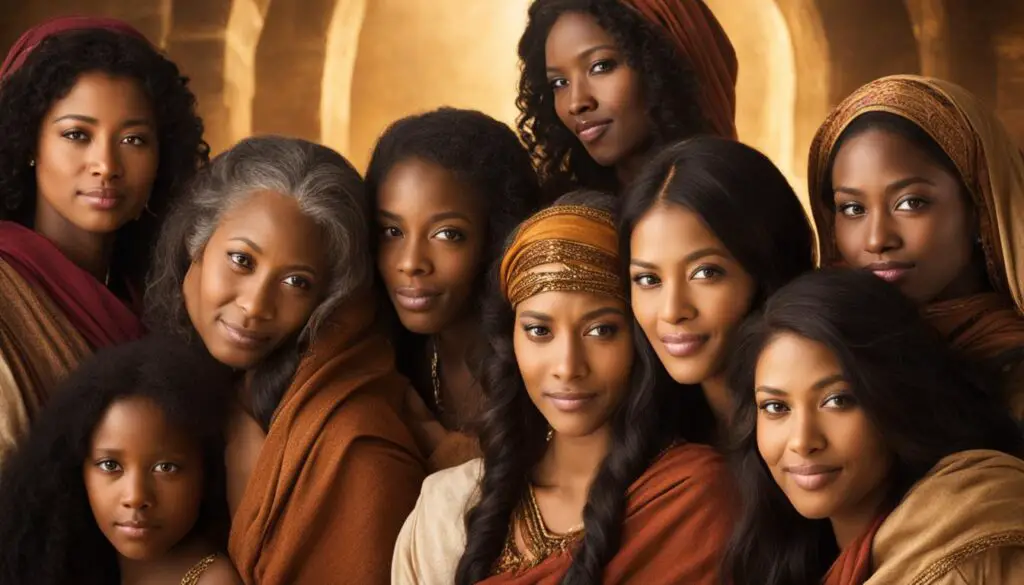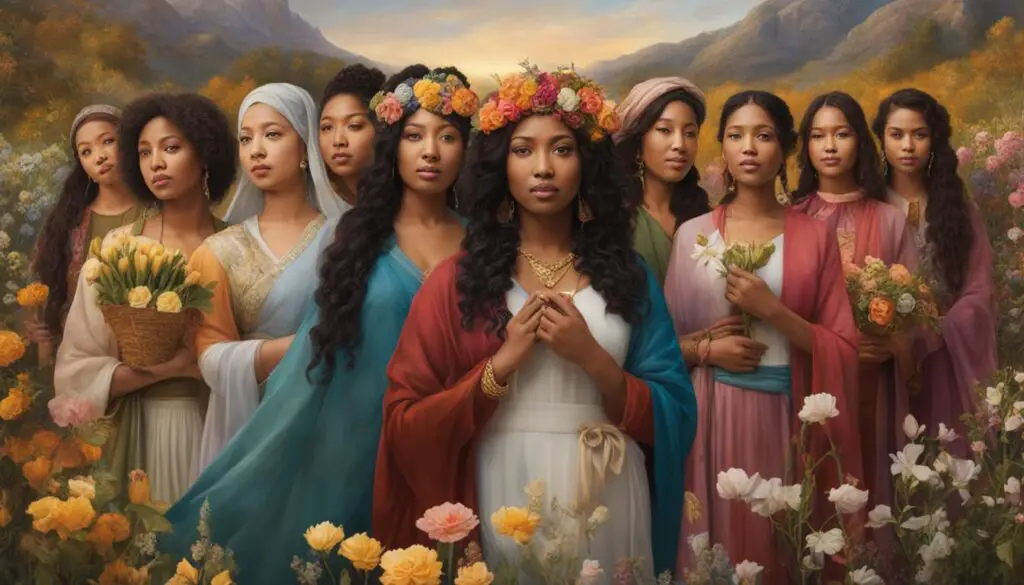The Bible, a sacred text revered by millions worldwide, offers profound insights into the definition and significance of womanhood. By exploring the stories and teachings within its pages, we gain a deeper understanding of the biblical view of women and their roles in God’s plan.
In the Bible, womanhood is not confined to societal norms or stereotypes but is rooted in the unique character and roles assigned to women by God. While recognizing the distinct differences between men and women, the Bible affirms the equal value and responsibility of both genders in serving and obeying the Lord.
Biblical womanhood goes beyond cultural expectations and empowers women to embrace their God-given gifts and talents, whether in careers or as homemakers. It recognizes that true beauty emanates from within – a gentle and quiet spirit – and reflects the glory of God.
Key Takeaways:
- The Bible defines womanhood as the unique character and roles assigned to women by God
- Both men and women have equal value and responsibility to serve and obey the Lord
- Biblical womanhood allows women to pursue their God-given gifts and talents
- A gentle and quiet spirit is valued in biblical womanhood
- True beauty is found in a woman’s inner self, reflecting God’s glory
Biblical Teachings on Womanhood
The Bible provides specific teachings on womanhood, emphasizing the biblical role of women and their significance in God’s plan. These teachings highlight a woman’s spiritual transformation through faith in Jesus Christ. While a woman’s role differs from that of a man, it is never regarded as inferior. Instead, the Bible emphasizes the importance of mutual submission and sacrificial love within the context of marriage. Women are encouraged to exhibit qualities like kindness, gentleness, and self-control, reflecting the character of Jesus.
According to biblical teachings, a woman’s worth and identity are found in Christ, prioritizing inner beauty over outward appearance. This biblical perspective on women extends beyond the roles of wives and mothers, allowing women to utilize their unique gifts and talents in various areas of life and society. Biblical womanhood affirms the value and contribution of women, empowering them to serve as Christ’s ambassadors and bring glory to God.
Submission and Mutual Respect
The Bible teaches the concept of submission, specifically within the context of marriage. Wives are called to submit to their husbands’ leadership, but this submission is not meant to imply inferiority. Instead, it aligns with the principle of mutual submission and respect between husband and wife. Just as husbands are called to sacrificially love their wives, wives are encouraged to submit to their husbands’ leadership in a spirit of mutual respect.
Inner Beauty and Worth
In contrast to society’s emphasis on external beauty, the Bible teaches that a woman’s true beauty lies in her inner self. Rather than focusing solely on appearances, biblical womanhood prioritizes the development of godly character and virtues. Women are called to cultivate qualities such as kindness, love, humility, and selflessness, which reflect the image of Christ. By finding their worth and identity in Christ, women can confidently embrace their biblical role and serve as beacons of light in the world.

Using Gifts and Talents
Biblical teachings on womanhood encourage women to use their God-given gifts and talents to serve others and bring glory to God. The Bible recognizes that women have diverse abilities and calls them to employ these abilities in various areas of life, including careers, ministry, and community service. By utilizing their gifts, women contribute to the flourishing of society and further God’s purposes on earth.
Quotes
“Charm is deceptive, and beauty is fleeting; but a woman who fears the Lord is to be praised.” – Proverbs 31:30
| Biblical Teachings on Womanhood | Key Points |
|---|---|
| Biblical Role of Women | – Women have a significant role in God’s plan. |
| Submission and Mutual Respect | – Wives are called to submit to their husbands’ leadership within the context of mutual respect. |
| Inner Beauty and Worth | – Inner character and virtues hold greater value than external appearances. |
| Using Gifts and Talents | – Women are encouraged to use their gifts and talents in various areas of life and society. |
Women in the Bible
The Bible presents numerous examples of women who played significant roles in the narrative of God’s redemptive plan. From Eve, the first woman, to influential figures like Sarah, Ruth, Esther, Mary, and many others, women are portrayed as agents of God’s purposes.
“The righteous man walks in his integrity; His children are blessed after him.” – Proverbs 20:7
These women displayed faith, courage, wisdom, and compassion, making invaluable contributions to their families, communities, and the overall story of salvation. They serve as powerful examples of the diverse roles that women can fulfill within the framework of biblical womanhood.
Examples of Women in the Bible
| Name | Role | Virtues and Contributions |
|---|---|---|
| Eve | First Woman | Mother of all living, symbol of the creation of womanhood |
| Sarah | Wife of Abraham | Demonstrated great faith in God’s promises and became the mother of many nations |
| Ruth | Moabite widow | Exemplified loyalty and dedication, became part of the genealogy of Jesus |
| Esther | Queen of Persia | Display of bravery, saved her people from a genocidal plot |
| Mary | Mother of Jesus | Humble submission to God’s plan, gave birth to the Savior of the world |
These stories provide inspiration and guidance for women today, highlighting the strength and impact that can arise from embracing one’s calling and walking in faith. The legacy of these female characters in the Bible resonates throughout history, affirming the profound influence of women within the Kingdom of God.

Embracing Femininity and Purpose
One common misconception is that biblical womanhood means conforming to societal standards of femininity. However, the Bible does not prescribe a specific external appearance or restrict women to stereotypical roles. Biblical womanhood celebrates the uniqueness of each woman and recognizes that femininity can be expressed in various ways. Whether pursuing a professional career or focusing on raising children and managing a home, a woman’s fulfillment comes from aligning her life with God’s purposes and using her gifts in service to others.
Contrary to popular belief, biblical womanhood does not mean adhering to rigid gender roles or conforming to cultural expectations. It is about finding one’s identity and purpose in God, rather than societal pressures or norms. Women can embrace their femininity in diverse ways, whether through their careers, parenting, creative pursuits, or acts of compassion and service. The biblical definition of femininity transcends superficial appearances and traditional gender roles, allowing women to express their individuality while staying anchored in their faith and values.
Each woman’s journey is unique, and there is no one-size-fits-all approach to biblical womanhood. It is about discovering God’s purpose for one’s life and living it out authentically. Some women may feel called to leadership roles or ministry, while others may find fulfillment in nurturing their families. The key is to seek God’s guidance and allow His Word to illuminate the path forward.
“Biblical womanhood celebrates the uniqueness of each woman and recognizes that femininity can be expressed in various ways.”
Celebrating Uniqueness and Diversity
The Bible’s perspective on womanhood celebrates the diversity of women and their unique contributions to society and the Kingdom of God. It affirms that each woman has been fearfully and wonderfully made, endowed with God-given gifts and talents to be used for His glory.
Biblical womanhood is not synonymous with conformity or mediocrity. It encourages women to flourish and excel in their endeavors, pursuing excellence in whatever they do. Whether in the workplace, community, or home, women are called to bring their best selves to the table, embracing their unique strengths and making a difference in the lives of those around them.

The Wife’s Role in Marriage
In the context of marriage, the Bible provides guidance on the specific role of wives. It emphasizes the principle of submission to the husband’s leadership, while also highlighting the husband’s responsibility to love his wife sacrificially. It is important to note that submission does not imply inferiority; rather, it reflects a willingness to honor and support the husband’s God-given role as the head of the household. This biblical perspective on women recognizes the importance of mutual respect, effective communication, and the pursuit of unity within marriage.
As stated in Ephesians 5:22-24, “Wives, submit yourselves to your own husbands as you do to the Lord. For the husband is the head of the wife as Christ is the head of the church, his body, of which he is the Savior. Now as the church submits to Christ, so also wives should submit to their husbands in everything.”
“Wives, submit yourselves to your own husbands as you do to the Lord.”
This verse emphasizes the need for wives to submit to their husbands in a manner consistent with their submission to the Lord. It is a call for wives to respect and honor their husbands’ God-given authority, recognizing that this submission is an expression of their faith and trust in God’s design for marriage.
Furthermore, it is essential to note that the role of the wife in marriage is not limited to submission alone. The Bible also emphasizes the husband’s responsibility to love his wife sacrificially, as stated in Ephesians 5:25-28:
“Husbands, love your wives, just as Christ loved the church and gave himself up for her to make her holy, cleansing her by the washing with water through the word, and to present her to himself as a radiant church, without stain or wrinkle or any other blemish, but holy and blameless. In this same way, husbands ought to love their wives as their own bodies. He who loves his wife loves himself.”
This passage emphasizes that husbands are called to love their wives selflessly, just as Christ loves the church. It is a sacrificial love that cherishes and cares for the wife, seeking her well-being and growth spiritually, emotionally, and physically. The biblical perspective on women within marriage is one that encourages mutual respect, love, and unity.
Building a Strong Marriage
To build a strong and thriving marriage, both husband and wife must embrace their respective roles as outlined in the Bible. This involves cultivating open and honest communication, practicing forgiveness, and prioritizing mutual understanding and support. By living out these principles, couples can experience the beauty and fulfillment that come from following God’s design for marriage.
A successful marriage is a partnership, where both husband and wife work together, recognize each other’s strengths, and rely on God’s guidance. As stated in Ecclesiastes 4:9-12:
“Two are better than one because they have a good return for their labor: If either of them falls down, one can help the other up. But pity anyone who falls and has no one to help them up. Also, if two lie down together, they will keep warm. But how can one keep warm alone? Though one may be overpowered, two can defend themselves. A cord of three strands is not quickly broken.”
This passage highlights the importance of unity and partnership within marriage. When husband and wife work together, supporting and encouraging one another, they can overcome challenges and build a strong, lasting bond.

| Roles and Responsibilities in Marriage | |
|---|---|
| Wife’s Role | Husband’s Role |
| Submission to the husband’s leadership (Ephesians 5:22) | Love the wife sacrificially (Ephesians 5:25) |
| Respect and honor the husband’s authority (Ephesians 5:33) | Provide for and protect the family (1 Timothy 5:8) |
| Create a loving and nurturing home environment | Lead the family with wisdom and humility |
| Support and assist in the husband’s endeavors | Listen to and value the wife’s input and perspectives |
| Pray for and encourage the husband | Pray for and encourage the wife |
Biblical Womanhood and Personal Transformation
Biblical womanhood begins with a personal transformation through faith in Jesus Christ. By believing in Him and surrendering our lives to Him, we become new creations, empowered to embrace and live out the principles of biblical womanhood.
Seeking biblical womanhood requires a deep commitment to align every area of our lives with the authority of the Word of God. It means recognizing that God’s Word holds the ultimate truth and guidance for our lives, and actively seeking His wisdom in all our decisions and actions.
To fully embrace biblical womanhood, we must lean into the guidance of the Holy Spirit. He is our divine helper and teacher, leading us in the paths of righteousness and convicting us when we stray. By cultivating a personal relationship with Him through prayer, study, and meditation on Scripture, we can grow in our understanding and practice of biblical womanhood.
In this journey, personal transformation is an ongoing process. It involves continually growing in character and pursuing godliness in every aspect of our lives. It means allowing the Holy Spirit to work in us, transforming our hearts, minds, and actions to reflect the image of Christ.
To embrace biblical womanhood, we must also recognize and utilize the gifts and talents that God has uniquely given us. Each of us has been fearfully and wonderfully made, with a purpose and calling that only we can fulfill. By actively using our God-given gifts, whether in our families, careers, ministries, or communities, we bring glory to God and contribute to the building of His kingdom.
Embracing biblical womanhood is a journey of personal transformation, alignment with God’s Word, and the intentional use of our gifts for His purposes. It is a call to live according to His divine design, finding fulfillment and joy in embracing the fullness of who He created us to be as women.
Celebrating the Diversity of Women
The Bible offers a profound appreciation for the diversity of women and their invaluable contributions to society. It beautifully portrays women from various backgrounds, with unique personalities and roles, all playing pivotal roles in God’s redemptive plan. These female characters in the Bible serve as inspiring examples of strength, faith, wisdom, and courage.
Women can find fulfillment in a wide array of spheres, each representing an opportunity to utilize their God-given gifts and talents to serve others and bring glory to God. Whether pursuing professional careers, engaging in ministry, embracing motherhood, or excelling in any area of their choosing, women are encouraged to live out their purpose fully and to make a significant impact in the world.
“And who knows but that you have come to your royal position for such a time as this?” – Esther 4:14 (NIV)
Just as Esther played a crucial role in saving her people, today’s women have the power to effect positive change in their families, workplaces, communities, and beyond. Biblical womanhood affirms that every woman possesses inherent value and purpose, transcending societal expectations and labels.
In embracing their diversity, women display the multifaceted nature of God’s creation and reflect His image. Each woman brings her unique strengths, perspectives, and experiences, facilitating a community where collective wisdom can flourish. By celebrating the diversity of women, we acknowledge the vast potential they hold and the transformative impact they can have on the world.

Female Characters in the Bible
| Name | Role | Key Contributions |
|---|---|---|
| Eve | The first woman | Mother of all humanity |
| Sarah | Patriarch Abraham’s wife | Mother of Isaac, renowned for her faith |
| Ruth | Moabite widow | Icon of loyalty, great-grandmother to King David |
| Esther | Queen of Persia | Instrumental in saving her people from genocide |
| Mary | Mother of Jesus | Honored by God to give birth to the Savior |
These remarkable women and many others demonstrate the power of women’s unwavering faith, resilience, compassion, and leadership. Their stories serve as a testament to the vast potential for women to shape and transform the world for the better.
The Importance of Inner Beauty
In the biblical perspective on women and their role according to the Bible, inner beauty holds tremendous significance. The scriptures emphasize that a woman’s true beauty lies within her character and virtues, rather than external attributes like elaborate hairstyles or fine clothes.
Outward appearances may capture attention momentarily, but it is the inner qualities that have lasting impact and reflect the image of Christ. Cultivating a gentle and quiet spirit, rooted in godly qualities like kindness, love, and selflessness, is what truly sets a woman apart.
When a woman focuses on developing her inner beauty, she becomes a vessel for God’s glory and radiates a distinct attractiveness that transcends physical appearance. This beauty not only garners admiration but also inspires and impacts those around her.
“Your beauty should not come from outward adornment, such as elaborate hairstyles and the wearing of gold jewelry or fine clothes. Rather, it should be that of your inner self, the unfading beauty of a gentle and quiet spirit, which is of great worth in God’s sight.” – 1 Peter 3:3-4
True beauty, as recognized by the biblical teachings on womanhood, is not superficial or fleeting. It is a reflection of a woman’s inner transformation and her alignment with God’s values and principles. This inner beauty is characterized by a heart that seeks to honor and serve God and others, making a lasting impact in a world that often prioritizes external appearances.
https://www.youtube.com/watch?v=A5WmJKU_LSo
By embracing the biblical perspective on women and focusing on developing their inner beauty, women can live out their womanhood according to the teachings of the Bible. They become empowered to make a difference through their words, actions, and their pursuit of godliness.
Cultivating Inner Beauty
Developing inner beauty requires intentional effort and a commitment to growing in Christ-likeness. Here are some practical ways women can cultivate inner beauty:
- Seeking a personal relationship with Jesus Christ and allowing His Word to transform their hearts and minds.
- Practicing humility and selflessness, considering others’ needs above their own.
- Cultivating a gentle and quiet spirit, characterized by patience, grace, and kindness.
- Showing love and forgiveness towards others, even in challenging situations.
- Nurturing a grateful heart and cultivating gratitude in all circumstances.
Embracing and prioritizing inner beauty not only brings fulfillment and joy in a woman’s life, but it also magnifies the impact she can have in her relationships, community, and sphere of influence. By exemplifying the beauty of Christ, women can inspire and encourage others to pursue a deeper relationship with God and embrace their own unique beauty rooted in Him.
References:
- The Holy Bible – New International Version.
Womanhood and Complementarity
Complementarity is a fundamental principle in biblical womanhood. Men and women have distinct roles and responsibilities that, when embraced and lived out, bring about a harmonious and balanced expression of God’s image in humanity. Biblical womanhood recognizes and celebrates the complementary nature of men and women, acknowledging the need for each other’s strengths and contributions. This complementarity is not based on superiority or inferiority but on the mutual support, respect, and partnership that lead to the flourishing of both genders.
Within the biblical perspective on women, the concept of complementarity embodies the idea that men and women are designed to work together in perfect harmony. Each gender brings unique qualities and strengths that complement and enhance the other. Complementarity in womanhood reflects the interdependence and unity between men and women, emphasizing their shared purpose and importance within God’s created order.
This concept is rooted in the biblical teachings on womanhood and the roles assigned to each gender. While men are called to demonstrate leadership and sacrificial love, women are called to embrace a spirit of submission and support. However, it is essential to note that this submission is not a sign of weakness or inequality. Instead, it is a beautiful expression of trust and partnership, where both genders work together harmoniously to fulfill their respective roles.
Embracing Complementarity
Embracing complementarity in womanhood involves recognizing and valuing the unique contributions and strengths of both men and women. It requires mutual respect, understanding, and a willingness to work together for the greater good. By honoring and affirming each other’s roles, men and women can create relationships, families, and communities that reflect God’s design and intention.
In the words of Audrey Hepburn, “The beauty of a woman is not in a facial mode but the true beauty in a woman is reflected in her soul. It is the caring that she lovingly gives, the passion that she shows. The beauty of a woman grows with the passing years.”
When men and women embrace their unique roles and work together in harmony, they can experience the fullness of God’s intention for their lives. This complementarity in womanhood leads to stronger relationships, healthy families, and flourishing communities that reflect the beauty and diversity of God’s creation.
| Benefits of Complementarity in Womanhood | Examples |
|---|---|
| 1. Mutual support and encouragement | Adam and Eve complementing each other in their roles as husband and wife |
| 2. Shared responsibility in raising children | Jochebed and Amram working together to protect and nurture Moses |
| 3. Unified decision-making in marriage | Elisabeth Elliot and Jim Elliot’s partnership in mission work |
| 4. Balancing strengths and weaknesses | Priscilla and Aquila complementing each other in teaching Apollos |
Complementarity in womanhood is not about gender competition or inequality. It is a beautiful expression of God’s design, where men and women work together, appreciating and celebrating their unique roles and contributions. When embraced with humility and love, complementarity fosters unity, harmony, and the fulfillment of God’s purposes in both personal and communal contexts.
Conclusion
The biblical perspective on womanhood offers a profound understanding of the value and significance of women in God’s plan. It goes beyond cultural stereotypes and societal expectations, providing a holistic view of femininity rooted in godliness and the alignment with God’s Word.
Through various examples of women in the Bible, we see how they faithfully served and brought glory to God in different roles and circumstances. Biblical teachings on womanhood emphasize the importance of embracing one’s unique gifts and talents, regardless of societal norms.
By embracing biblical womanhood, women experience personal transformation and fulfillment. They reflect God’s image through their character, virtues, and the use of their talents for His purposes. In this pursuit, unity and complementarity between men and women are valued, creating a balanced and harmonious expression of God’s image in humanity.
Ultimately, the biblical definition of femininity empowers women to live out their God-given roles and to make valuable contributions to their families, communities, and society as a whole. It is an invitation to align one’s life with the principles and teachings of the Bible, resulting in personal wholeness and the pursuit of God’s glory.
FAQ
What does the Bible say about womanhood?
The Bible defines womanhood as the unique character and roles assigned to women by God. Men and women have different roles and responsibilities, designed by God to complement each other.
Are men and women equal in the Bible?
Yes, in Christ, both men and women have equal value and responsibility to serve and obey the Lord.
Are women limited to specific roles according to the Bible?
While the Bible does describe specific roles for women, it does not limit them to stereotypical roles or prescribe a specific external appearance.
Can women have careers or should they focus solely on homemaking?
The Bible allows women to pursue their God-given gifts and talents, whether in careers or as homemakers, as long as they align their lives with God’s purposes.
Who are some important female characters in the Bible?
The Bible showcases numerous women who played significant roles in the narrative of God’s redemptive plan, including Sarah, Ruth, Esther, and Mary.
How should women prioritize their inner beauty according to the Bible?
The Bible teaches that a woman’s true beauty lies in her inner self, consisting of a gentle and quiet spirit, reflecting God’s glory.
What is the role of wives according to the Bible?
The Bible highlights the principle of submission for wives within the context of mutual submission and sacrificial love in marriage.
How can women embrace biblical womanhood?
Embracing biblical womanhood starts with a personal transformation through faith in Jesus Christ and a commitment to align one’s life with the authority of the Word of God.
Does biblical womanhood promote diversity?
Yes, the Bible recognizes and celebrates the diversity of women and their unique contributions to society, affirming that women have inherent value and purpose.
What is the importance of complementarity in womanhood?
Complementarity is a fundamental principle in biblical womanhood, highlighting the need for mutual support, respect, and partnership between men and women.







